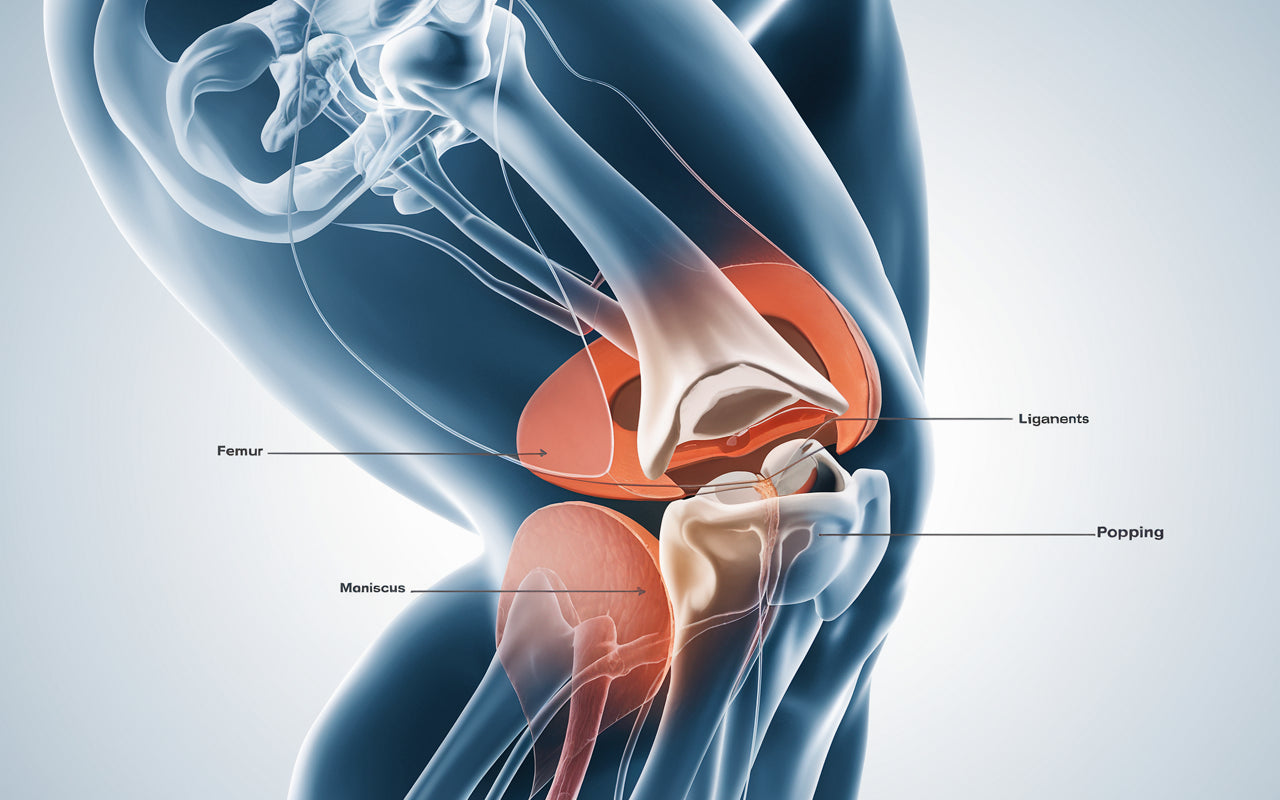Knæplager: Årsaker, symptomer og når du bør søke hjelp

A popping, cracking, or creaking sound from your knees is a common occurrence that most of us experience at some point in our lives. But what does it really mean? Is it something to worry about, or is it completely harmless? In this article, we’ll go over everything you need to know about popping knees – from the causes and symptoms to when it’s time to seek medical attention. We’ll also give you practical tips for dealing with the problem and improving your knee health.
What Causes a Clicking Sound in the Knee?
A clicking sound in the knee can be caused by several different factors. Here are the most common causes:
- Irregularities in the Joint Cartilage: In younger people, irregularities in the joint cartilage can create noise when the knee moves. This is usually harmless but can develop into a degenerative process over time.
- Knee osteoarthritis (Joint wear and tear): In older people, a clicking sound can be a sign of osteoarthritis, where the cartilage wears down and the joints become less flexible. This often affects the ends of the bones where the thigh meets the lower leg. Read more about osteoarthritis in the knee .
- Gas Bubbles in the Synovial Fluid: When gas bubbles in the synovial fluid burst, it can create a popping sound. This is completely normal and not harmful to the joints.
- Tendons Sliding Over Bones: Tendons that move over bone structures, especially around the kneecap in the front of the knee, can sometimes cause a cracking sound.
- Meniscus Injury or Loose Cartilage Pieces: Injuries to the meniscus or loose cartilage pieces can cause the knee to snap and cause discomfort. This is especially common after sports activities or a cruciate ligament injury where the cruciate ligament has been damaged.
Symptoms to Watch Out For
In most cases, clicking knees are harmless. However, if you experience any of the following symptoms, it could be a sign of an underlying problem:
- Knee pain that occurs when you snap your knee, especially in the front of the knee.
- Swelling or warmth in the knee joint, which may indicate a meniscus injury.
- Stiffness, especially after a long period of inactivity, which is common with knee osteoarthritis.
- Limited mobility or difficulty moving the knee freely, often related to the discomfort from an injury.
- Instability or a feeling that the knee is "giving way", which may indicate a cruciate ligament injury where the cruciate ligament is affected.
If you also experience pain on the inside of your knee when you click, it may be a sign of overuse or inflammation.
When Should You Seek Care?
A popping sound in your knee is usually nothing to worry about. However, you should seek medical attention for diagnosis and possible treatments if you experience any of the following:
- Persistent knee pain that does not go away with rest.
- Significant swelling or redness in the knee joint, especially after sports.
- The knee locks or feels unstable, which may indicate a meniscus injury or problems with the kneecap.
- Difficulty bearing weight on the knee, which may indicate a more serious injury.
If you are unsure of the cause of your symptoms, it is always best to consult a doctor or physical therapist for a professional diagnosis. These signs often resemble the symptoms of a meniscus tear , which requires medical evaluation.
Treatment and Management of Knocking Knees
Depending on the cause of your discomfort, there are several ways to manage and treat knocking knees:
- Strengthening Exercises: Regular exercise that focuses on strengthening the muscles around the knee, especially those that support the kneecap and thigh, can improve stability and reduce discomfort.
- Knee Comfort™ – A Specially Designed Knee Protector: Offers support and stability for the knee joint, compression that reduces swelling and increases blood circulation, and protection against overload and further injury.
- Rest and Recovery: Avoid overloading and give the knee joint time to recover, especially if you have a degenerative process in the joints or after sports.
- Anti-Inflammatory Medications: If needed, medications such as ibuprofen or naproxen may be used to reduce inflammation and knee pain as part of your treatments.
If the clicking is combined with stiffness in the knee , treatment should be started early for best results.

How Knee Comfort™ Can Help You
KnäKomforten™ is more than just a knee brace – it is a solution for maintaining good knee health. Here are some of the benefits:
- Improved Stability: Provides support to the knee joint and reduces the risk of injury to the cruciate ligament and other structures.
- Reduces Discomfort: The compression helps relieve knee pain and swelling in the front of the knee.
- Customizable Fit: Designed to fit comfortably around the kneecap and securely during all activities, including sports.
- Long-Term Health: May help prevent future knee joint problems and reduce the risk of degenerative changes in the cartilage.
The product is also ideal for people with unstable knees , where extra support is required during everyday movements and exercise.
Buy nowConclusion
A popping sound in the knee is usually harmless, but it is important to pay attention to other symptoms such as knee pain, swelling or instability. By exercising regularly, avoiding overuse and using supportive aids like the Knee Comfort™, you can take care of your knees and reduce the risk of future problems.
If you experience persistent discomfort, don't hesitate to seek professional diagnosis. Your knees carry you through life - give them the care they deserve!
Frequently Asked Questions (FAQ)
Is it dangerous if my knee snaps when I stretch it?
Most often not. A popping sound without knee pain or other symptoms is usually harmless.
Can clicking knees be a sign of osteoarthritis?
Yes, especially in older people, clicking sounds along with knee pain and stiffness can be signs of osteoarthritis where the ends of the bones in the thigh and lower leg are affected.
How can I reduce the clicking in my knees?
Regular exercise to strengthen the muscles around the knee and the use of supportive aids such as Knee Comfort™ can help, especially if you have problems with your kneecap.
When should I worry about a cracking knee?
If the cracking is accompanied by knee pain, swelling, instability, or limited mobility, you should seek medical attention for diagnosis and possible treatments.
Can Knee Comfort™ help with clicking knees?
Yes, the Knee Comfort™ provides support and stability to the knee, which can reduce discomfort from a meniscus injury or kneecap problems and potentially reduce popping sounds.

